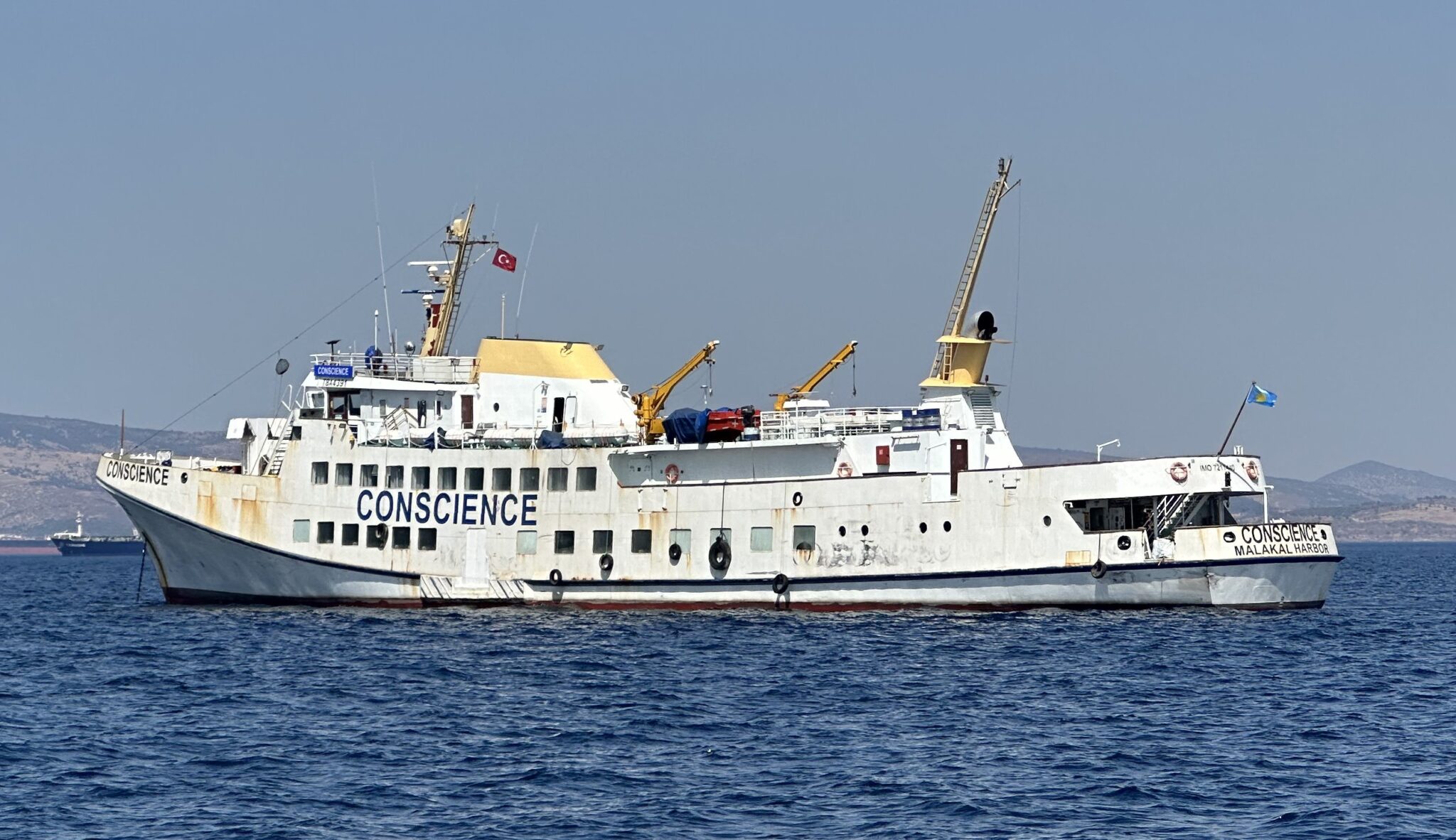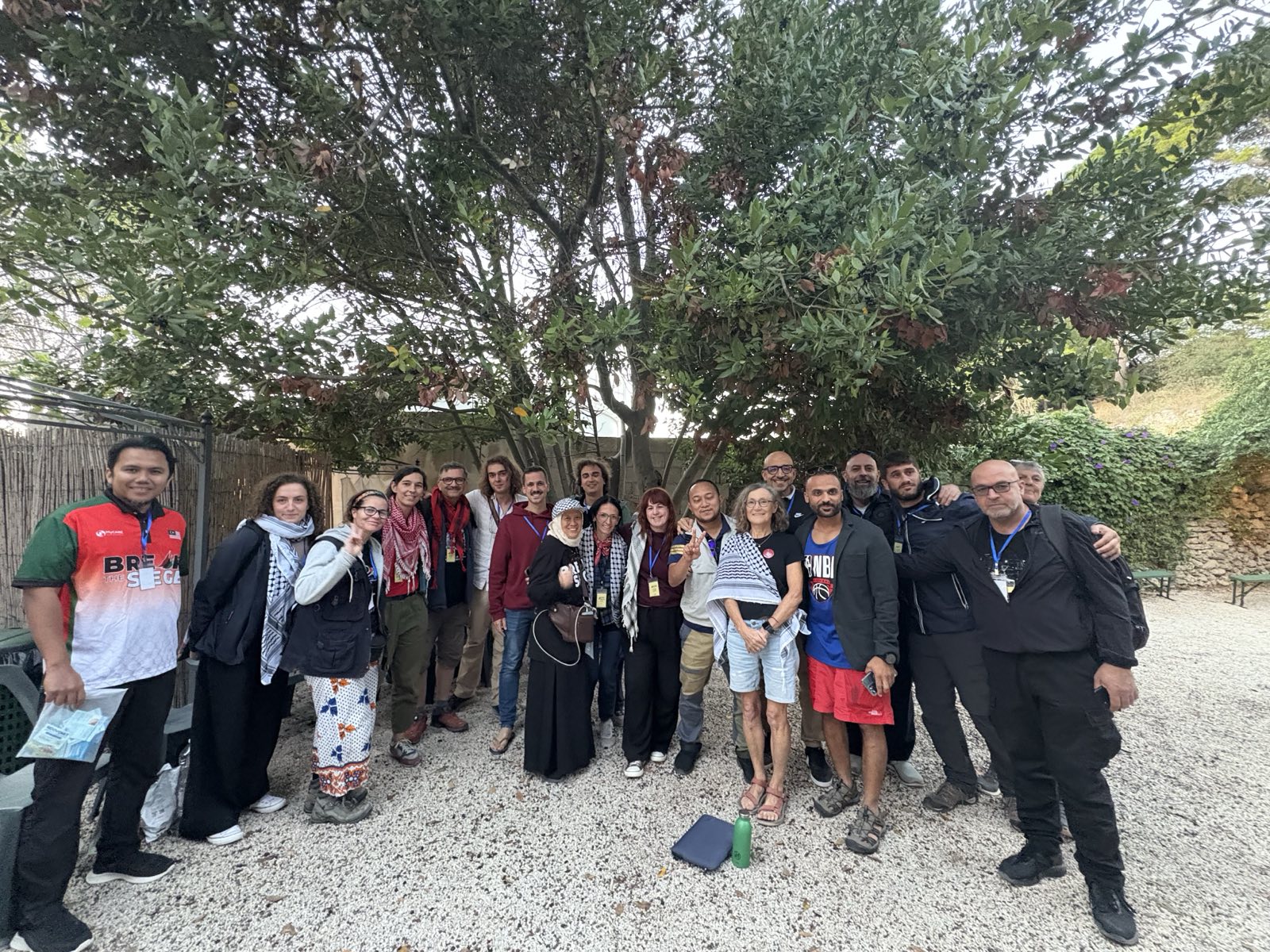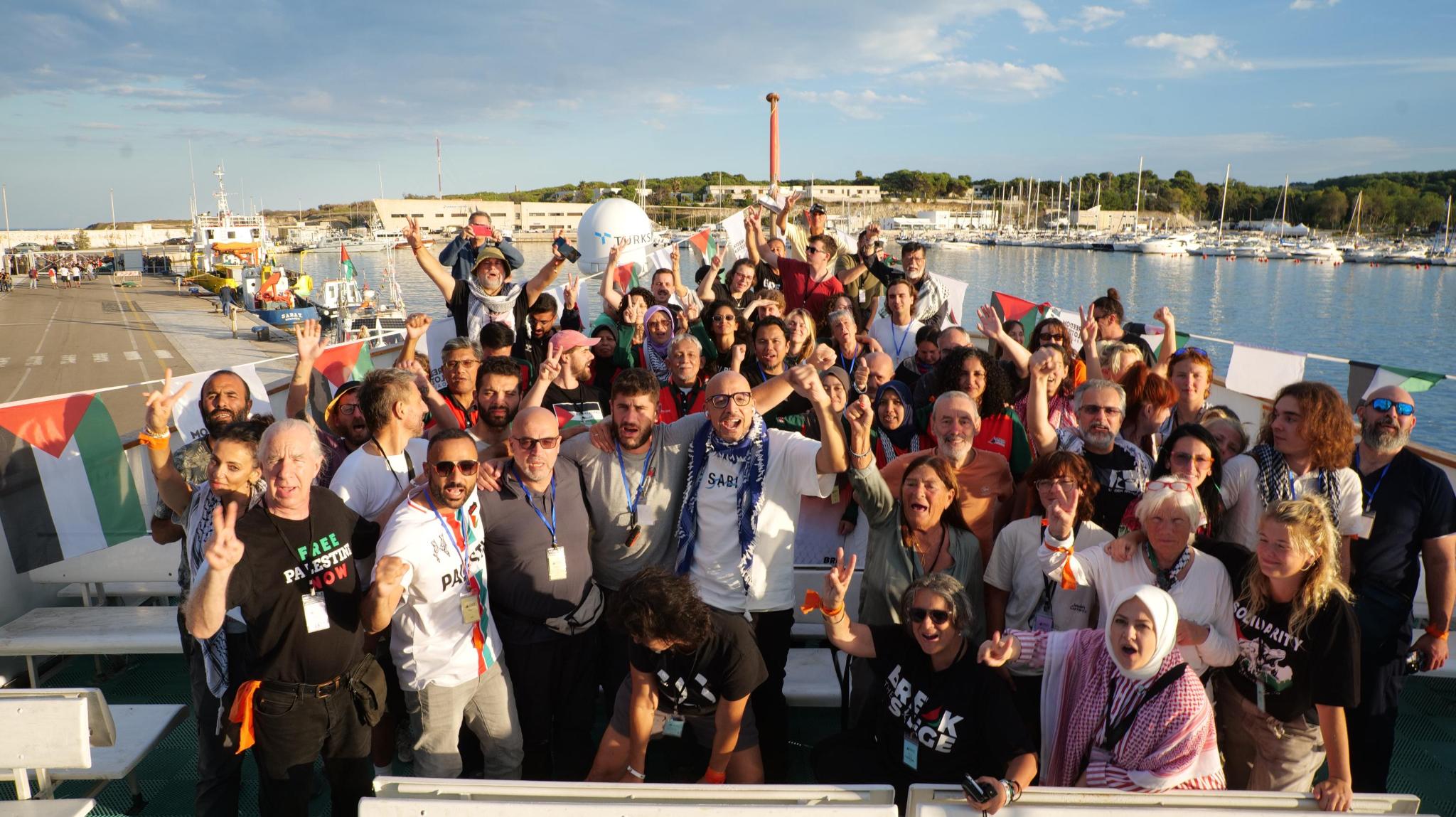- Opinion
- 12 Nov 25
Flotilla activist Dr. Veronica O'Keane: "Their brutality strengthened us; there was nothing else to do except resist"

After being abducted and imprisoned in inhumane conditions by Israeli forces, Dr. Veronica O'Keane has returned to Ireland. Sitting down with Hot Press, she recounts her time on the humanitarian aid flotilla in all its highs and lows — and as she tells it, it was the highest of highs and the lowest of lows.
When the waves of humanitarian aid flotillas set sail for Gaza, Israeli politicians called them everything from "glorified rafts" to "selfie yachts." Each boat carrying baby formula, medicine, food and more was intercepted. Israeli forces claimed they treated all activists, journalists and medics on board with respect and regard for safety.
Activists who were detained say otherwise.
Dr. Veronica O'Keane, professor of psychiatry at Trinity College Dublin, was aboard a medical worker and media boat named "Conscience." It was part of a nine-strong fleet which departed from Otranto, Italy, shortly after the Global Sumud Flotilla (which notably involved Swedish activist Greta Thunberg).
She recounts the moment Conscience was captured with chilling detail. In the dark of an otherwise quiet early morning at sea, an alarm cut through the silence and launched the crew into the protocols they had drilled for weeks.
"By the time we scrambled up on deck and into our life jackets, the helicopters were already descending, blowing storm on the deck below," she recounts.
"The soldiers emerged, dripping in armoury. They were like giant insects. They had night vision goggles on their helmets and belts laden with warfare, and the lasers from their guns were pointed at our life vests. The racism was immediately apparent. Anybody who was brown skinned and male was given special attention. If they moved in the wrong way, they were dragged with their hands zip-tied behind their backs and put on a seat in the upper deck."
As intimidation and fear washed over the boat, activists hummed 'Bella Ciao', an Italian partisan song famously dedicated to the resistance against fascism in WWII.
 Conscience preparing to depart as a brass band plays from the docks. A combination Irish and Palestinian flag can be seen hanging from the hull. Photo: Freedom Flotilla
Conscience preparing to depart as a brass band plays from the docks. A combination Irish and Palestinian flag can be seen hanging from the hull. Photo: Freedom Flotilla"The people of Otranto, where we launched, had sung it to us with their brass band walking down the pier," O'Keane explains.
"It was a very moving moment, so it became our song. We decided to hum it to calm ourselves, but the Israeli soldiers immediately silenced us with their guns."
The soldiers herded them below deck into the dining area, a tiny room not made to hold nearly 100 people. O'Keane describes the conditions as extremely hot with no room to lie down, adding that if anyone tried to speak out loud, the soldiers would shout and bang their rifles on the table.
One woman, an elderly patient of O'Keane's with several complex medical needs, fell ill. O'Keane says the Israeli soldiers were very reluctant to allow her to provide medical care. When she told them the woman needed her medications, she says the soldiers attempted to give her nondescript pills which they had brought with them.
"I said, 'No, there are 40 doctors on board. This is not her medication. Why would I poison my own patient?' So eventually, they allowed me to help her.
"Later in the day, a younger man became very unwell. I could see that he was probably having a diabetic episode. He was sweating heavily, and he looked like he was going to pass out. I went to give him assistance and I was confronted by an Israeli soldier who blocked my way. [The soldier] continued to tell me to sit down, and my colleagues urged me to sit down, which I only did once he pulled a taser on me and held it to my body."
Upon reaching shore, O'Keane says detainees were processed in a massive building, surrounded by Israeli officials who shouted at and taunted them. She describes being manhandled, strip-searched and humiliated. Activists were given deportation orders to sign. Those who complied were fast-tracked to be deported, while those who refused were imprisoned.
"I initially thought I was going to sign it because I didn't think there was any point in not signing it. You're going to be deported anyway," O'Keane explains.
"But when I was confronted with their brutality — in particular when I saw the racism and the way they treated the Black women — I decided I was absolutely not going to cooperate in any way, shape or form. I was going to resist with every tool that I had at my disposal."
For that, O'Keane would be imprisoned for four and a half days. On the way to prison, she recalls being frequently blindfolded, left with minimal clothes and shoved around with little indication as to where she was supposed to go.
"The prison had a massive courtyard with a massive poster in the middle of it. It was a picture of a Palestinian woman walking down a rubble-strewn road in Gaza, and underneath it, it said 'The New Israel' with a Palestinian flag. The project was there for all to see, and that's where we spent the next two days being brutalised by prison staff."
O'Keane describes filthy mattresses and blankets and a lack of food, sanitation or toilet paper. The tap water was visibly dirty and they were refused fresh water. She says, "It was a question of trying not to gag or poison yourself on the tap water, but also drinking enough to stay alive."
"No taunts were too small. A lot of women started menstruating because of the stress. They were ridiculed by guards and denied any sanitation products for long periods of time. You had to bang the door constantly to get anything. The place was filthy. Between everything, it was difficult to sleep."
As a medical professional, O'Keane was hyperaware of the failing health of those around her. But without attention or care from the Israeli captors, she says there was nothing she could do.
"The soldiers would come in and get you to stand up every few hours, and once or twice I stood up and had a bit of a faint. Some of the other women had other problems. We had a pregnant woman who was refusing food like me; she felt very grim. We had another woman who had tachycardia, which is a very high heart rate, and I was very worried about her."
One morning, without warning, they were shoved into a van and driven to Amman, Jordan. They didn't know where they were going until they got there and realised they were free. They returned to their home countries shortly after.
 The flotilla vessel Conscience. Photo: Freedom Flotilla Coalition.
The flotilla vessel Conscience. Photo: Freedom Flotilla Coalition.Through it all, she says, "our will was absolutely iron and that kept us together and kept us united."
"Their brutality strengthened us, actually. There was nothing else to do except resist."
The mission was a joint endeavor by Freedom Flotilla Coalition and Thousand Madleens to Gaza. The largest boat in the flotilla, Conscience carried activists from 25 countries, who were referred to as the "medics and media" crew.
"The aim of Conscience was to fill it with medical workers and journalists and catch up with or at least come in the wake of the other flotilla, and make a second attempt to break the siege," O'Keane says.
"The boat was a sort of new departure. Although there had been big boats previously, they'd been mostly activists. This boat was professional journalists, documentary makers and a wide range of healthcare workers."
 Veronica O'Keane with fellow medics in their pre-departure nonviolent response training. Photo: Veronica O'Keane.
Veronica O'Keane with fellow medics in their pre-departure nonviolent response training. Photo: Veronica O'Keane.O'Keane and her fellow doctors were well aware of the assault on medical infrastructure in Gaza. Hospitals and ambulances have been regular targets of Israeli strikes, with reports of healthcare workers being detained without charge.
O'Keane explains the long-term psychiatric implications.
"Every child in Gaza is living with the scar of the genocide for the rest of their lives, and their children, if they go on to have children, will also live with that knowledge because trauma transfers across generations. Trauma changes the way your body works, it changes the way your genes unfold, the proteins that you produce.
"So trauma has been embedded in the genes of these poor children and in all of the genocide survivors. Even if they're not physically impaired, surgically or medically impaired, it lives on as a memory that will never be forgotten. We're talking about generations to come who will feel sad and bitter, and why wouldn't they?"
O'Keane was the only Irish healthcare worker on board, representing Irish Healthcare Workers for Palestine. The only other Irish citizen on board was independent filmmaker Fionn Macarthure.
Through it all, she says her community at home held a strong place in her heart and mind.
"It's difficult to express the sense of love and humanity that I experienced upon my return. Irish Healthcare Workers for Palestine, my local Palestine support group in Dublin, my daughter, my close friends; It was a group effort. Amid everybody on the boat, myself and Fionn were the only two Irish people, but we were supported by thousands of people back home."
She had found a sort of family on her mission, too— on the boat and on the shore.
 Flotilla participants aboard Conscience. Photo: Freedom Flotilla
Flotilla participants aboard Conscience. Photo: Freedom Flotilla"People were there with us and we felt it. When the Global Sumud Flotilla was almost nearing Gaza and we had just sailed out of the port in Otranto, the whole country nearly shut down. Millions went out to protest. We felt we were sailing with the world and bringing a message of resistance and of hope.
"We're all doing our part. That mission was my particular part that I was lucky enough to do. I loved being there. It was a wonderful privilege to be on a ship carrying a message of hope and resistance to the beleaguered people of Palestine. It was exactly where I wanted to be and it was wonderful to feel like I had the weight of the Irish people behind me."
While she felt the support of the general public on her mission, she says the Government has not been representative of the views of the people.
"With Catherine Connolly being elected president, you could not have a better demonstration of how the government is at odds with the people and how we're not being represented. Catherine got a huge majority, and she got it because of Gaza. She got it because of our resistance. She got it because she's a non-government candidate.
"This movement isn't going to go away, not here," O'Keane concludes. "This movement is deeply embedded in the Irish psyche, in our history and in the way we want to shape our future as well. This is who we are."
RELATED

- Opinion
- 11 Nov 25
Council tenants to protest in Dublin against proposed rent hikes

- Opinion
- 04 Nov 25
Palestine Action Éire target Allianz Insurance offices

- Opinion
- 03 Nov 25







